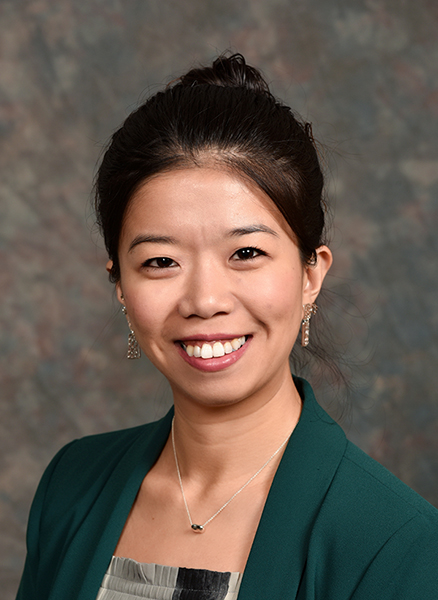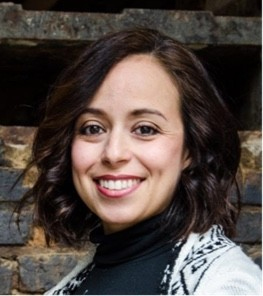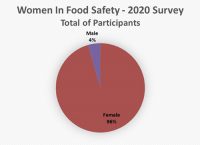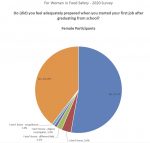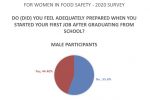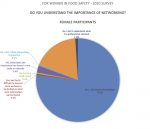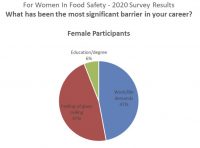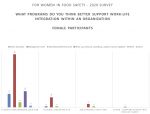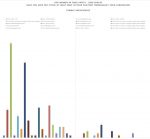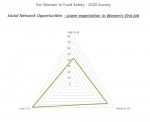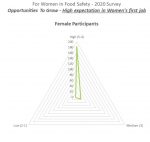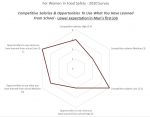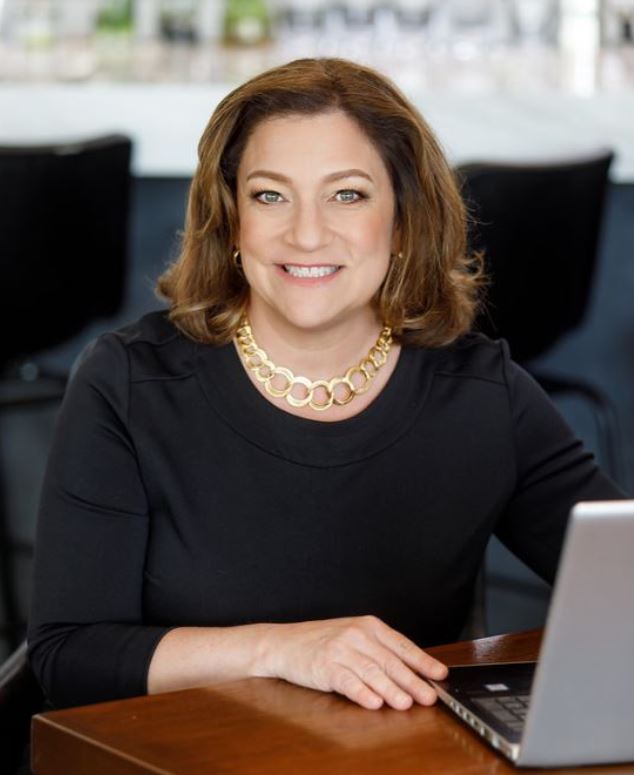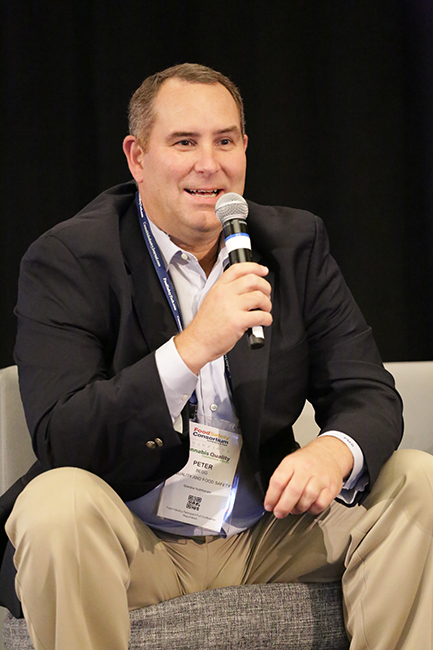Early this year, Jill Stuber, who currently owns her own business called The Food Safety Coach, which focuses on coaching and consulting in the industry, accepted Women in Food Safety’s invitation to be interviewed. The hour went by fast, and Jill shared many insights on how her mindset changed from a microbiologist, to food safety professional to now as a business owner. Jill grew up on a farm in Wisconsin where she was first exposed to “food science 101”. It was not until her junior year of college that Jill officially took the course and confirmed that she really liked it. “It was the time I spent on the farm which formed my career foundation. It was the knowledge of agriculture and the intuition about product safety,” she said.

Jill still remembers how she got her first job out of college—a lot of which involved being persistent. She called Land O’Lakes every month to check whether there was an opening because it was her dream company, and she always wanted to be part of it. “Every time I drove past the building, I thought to myself, ‘I could work for them’”. Finally, the company responded that they were looking for someone to make the media in the lab, and Jill took the position without hesitation.
That first job started Jill’s career. She learned so much about lab management during her time at Land O’Lakes. Throughout her career, she tried many different roles related to food safety before she landed squarely in food safety. Jill suggested that those who are facing choices should trust their intuition. “It’s what drives you to the direction that there is something there for you,” she added.
It certainly was a shift when Jill started her own business during the pandemic. “I have always wanted to do it, but I hesitated for years, and COVID-19 helped me make the decision. It was my first full year owning my own business.” When asked what prompted her to start a business in coaching, Jill shared the following personal story.
Jill talked about an early career struggle when she first served as a corporate food safety & quality manager across three production facilities and the corporate lab. There was an instance in which the entire team was facing a challenging situation and her boss told her she had to let go one of her team members. She felt really bad—even until today. “In that moment, and for me, it was a personal thing. I just had to step back and say, ‘this is not right’. I still remembered the feeling, which was awful,” Jill said. This is certainly not the value Jill believed in and grew up with. She believed in working hard as a team and helping and trusting each other. “I asked the company to work with a coach so I could process the event, and that’s when it opened up my eyes to how coaches can navigate and support a person. I love helping people, and that’s how my interest in coaching started and it was the seed for establishing my business.”
Jill Stuber and other food safety experts discussed “The New Normal: COVID-19’s Lasting Impact on the Food Industry” during an Episode of the Food Safety Consortium Virtual Conference Series on May 20, 2021The one thing that Jill believes today and throughout all her obstacles is to never give up. “Never say ‘no’ and never take ‘no’ for an answer. Of course, there will be hard times, but I always find another pathway. You have to be persistent and know where you are going and why you are doing it, and keep on that,” Jill said.
We ended our conversation discussing how we see the future for talented female professionals in the industry. “I think women are on a fantastic path of providing support for each other and even for others, not just women. I think we are doing a great job of trying to connect and understand what that support looks like. We are going to see more and more women are in decision making roles—roles they are really engaged in and thriving,” she said. “Women are standing in their power and becoming more and more comfortable in these positions. It’s also about recognizing the gifts that you bring.”
Melody Ge: How does it feel of being a CEO? Do you feel any different versus other roles that you’ve had?
Jill Stuber: LOL! I do not feel differently. I enjoy the flexibility it offers me, especially this past year with COVID. My kids are home, distance studying, and so it really helped me balance my time with my family. My ultimate goal is to live life on my own terms by helping people. So, it is definitely getting me a step closer to be able to do that, which is really all about just trying to be more present and have richer experiences versus going through the motions.
Ge: Sometimes it’s very hard to achieve living on your own terms. How did you start? Any words of advice?
Stuber: I always recommend starting small. Sometimes it is overwhelming when you think of the entire plan, right? Like for me, for example, stepping away from a steady income with a company is really hard to do. It is scary. If I had done that first, I probably would have not made the leap. However, I started small by really doing something a little different or making different choices each day in the direction I wanted to go versus “all-in”. This applies even to how I spend my time. After work, I usually would do things for my family, make dinners and do laundry. But I passed that stuff all to my family, not that I neglected my family, but I get everyone involved so that way I can make choices to maybe work on my own business, spend time with my family or even focus on self-care. So, every day, it is evaluating every single small thing I can do to help move in the direction that I ultimately want to be at.
Ge: We often hear people say that women are too emotional. What’s your opinion on that? Does emotion have a big impact on your decision making as a CEO?
Stuber: I think the big factor really has a lot to do with trusting yourself and your intuition. I know one of the questions here is being emotional. However, I really think that as business owners and women in the industry, we should embrace being emotional, because it is what gives us the empathy and compassion. And for me, emotion really helps me better serve my clients. At the end of the day, if I cannot serve them to the best of my abilities, I have failed both of us. I really try to listen to what they need so that I am helping them get the results they want. Sometimes, I think, what is wrong with being emotional? Why is there judgement around being emotional?
Ge: Yes! I thought about it too!
Stuber: It’s important (and good) to remember that women are wildly different than men. We process emotions and feelings differently. When we listen to the messages that women send us, it helps us really step into where we need to go to provide support. When we ignore those things and cut them off, I think it gives us a gap where our intuition is telling us to go versus where our mind is telling us to go. Our emotions keep us on, and I think it is kind of a check and balance on where we are going, and what is true to us. Our emotions bring us to alignment to what is going on. Also, I think it relates to how emotions play into the conversation. Even as we talk about bringing more women into leadership positions and organizations, I love that we still talk about what skills we need to get in there. However, sometimes, I wonder about how we can prepare the people already at the table for the leadership styles we, women, bring. Because it is not always about women having to adopt a new style or learn to make a decision differently, or to be less emotional, but how we prepare people who are already there to work with us and to understand how that emotion makes female valuable leaders in the space.
Ge: Do you have any advice, or some lesson learned, to share with the young professionals in the Women in Food Safety group?
Stuber: I would say there are two. First, it is following your intuition. I didn’t do this well when I was young; I followed technical data for quite a while. Now, with more experience, I think following and trusting your intuition is more valuable. I used to rely on technical data and thinking I had to have the answers; but really taking the time and engaging in human-to-human interaction is so much more powerful. The second piece of advice I would offer is that it’s okay that you don’t have all the answers. I think we are programmed as we go through the school that we are supposed to know the answers. It’s equally important to know how to find the resources and answers. I think that is important to share because in the end, the group of young professionals coming into the industry are the next generation that is going to make the difference in the industry. So, whatever we do to support them is important! I would like to let them know that we all want them to be successful and to love what they are doing. So, even though sometimes the industry can be intimidating, never be hesitant to reach out to others in the industry. Utilize and build your own network and be part of communities that can support you and allow you to support them in return.

